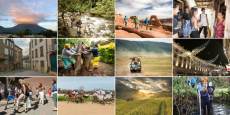10 Reasons Rollins Delivers the Best in Study Abroad
We’re looking forward to when the world once again becomes our classroom. In the meantime, explore 10 of the reasons Rollins continues to rank as one of the nation’s best colleges for study abroad.
By Stephanie Rizzo ’09
February 10, 2021

At Rollins, study abroad isn’t the exception—it’s the norm. After all, more than 70 percent of Tars participate in at least one international program during their time at Rollins, and the College just ranked—for the fourth consecutive year—among the top 10 master’s-granting institutions nationwide for the percentage of students who study abroad. Rollins’ emphasis on global citizenship makes it an ideal fit for students looking to expand their worldview, whether that means spending a semester living and learning in Australia or dedicating a few weeks of summer to building an ecolodge in the foothills of Mount Kilimanjaro.
“We have a strong student support model where we work with students to make sure they have whatever support they need to study abroad,” says Giselda Beaudin, the College’s director of global initiatives. “We also benefit from Rollins’ emphasis on experiential learning. At Rollins, it’s not just about what you do in the classroom—it’s also about creating a well-rounded college experience.”
Even with passports tucked away this past year due to the pandemic, the far-reaching work of gaining global perspectives and increasing cultural fluency has remained very much in progress at Rollins. From deep cultural immersion to rigorous coursework, here are 10 of our favorite ways Rollins consistently ranks among the top institutions in the country for study abroad opportunities.

1. Variety and Flexibility
No matter what you’re interested in, Rollins offers dozens of study-abroad programs through the Office of International Programs and even more through partners like the School for International Training (SIT). With more than 90 programs to choose from, you can tailor the experience to your goals with short-term field studies or semester- and summer-long programs. Faculty and staff advisers help you choose from a host of options tied to criteria like internships, your major, relevant industries, service opportunities, or specific destinations.

2. A Gateway to Greatness
Prestigious scholarships with an emphasis on travel—such as the Boren Scholarship, the U.S. Department of State’s Critical Language Scholarship, and the Fulbright Scholarship—tend to recruit students with study abroad experience. With such high participation in international programs, it’s no coincidence that Rollins is continually recognized as a top producer of U.S. Fulbright Scholars. Tars who study abroad as undergrads have a competitive edge when applying for international jobs, fellowships, and graduate programs.
“Once a student’s curiosity about travel and global learning has been sparked, it’s difficult to turn that back off,” says Beaudin. She explains that students often come back from abroad and immediately want to go back. In those cases, the Office of International Programs works closely with the Center for Career & Life Planning and the Office of External & Competitive Scholarship Advisement, a collaboration made much easier now that the three offices are co-located in the new Kathleen W. Rollins Hall.

3. Jump-Start Your Experience
Can’t wait to board that plane? Thanks to Rollins’ First-Year Field Study, you don’t have to. Each year, environmental studies professor Barry Allen leads a group of incoming first-year students on an expedition through Costa Rica’s national parks. Open to all incoming students, the 10-day field study is packed with adventures like exploring the Monteverde Cloud Forest and spying capuchin monkeys all while learning about sustainability and conservation before you set foot in a Rollins classroom. Just ask Mikayla Panariello ’21, who while trekking through the rainforest decided to devote her career to environmental policy and sustainable development.

4. Instagrammable Adventure
Snorkel the Great Barrier Reef after a day of researching in the lab. Trek into the heart of Serengeti National Park before spending a few days mixing compost in a Tanzanian village. Explore lavender fields in the South of France following a lecture about 18th-century art. Many of these once-in-a-lifetime adventures are built right into your study abroad program and serve only to enrich your overall educational experience.

5. Do Good
Service learning is central to the Rollins mission and a meaningful way to connect with a new culture. Many international programs, such as political science professor Dan Chong’s field study to Tanzania, focus on community engagement and development. These experiences tap into vital problem-solving skills, teaching students to learn by doing and helping others along the way. After participating in Chong’s field study for two summers, Nico Khazzam ’18 went on to teach English in Brazil as a Fulbright Scholar and is thinking about becoming a professor. “I’d love to be able to take students on field studies so I can watch their eyes open as wide as mine have,” he says.

6. Global Learning Here at Home
We’re always integrating global perspectives into our classroom learning as a foundational lens through which to view the world. In a year without travel, we’ve ramped up these offerings even more by creating new avenues of global engagement. Whether it was taking Global Citizenship: No Passport Required, a one-credit course that helps students reflect on intercultural experiences, or taking part in remote development work in Uganda through the new Virtual Global Fellows program, Rollins students remain well prepared for the day they can once again take flight.

7. Access to Aid
Every semester-long study abroad program offered through Rollins is designed to cost as much as a regular semester, meaning your tuition and housing costs stay the same, and your normal financial aid rolls over. “Our goal is to make these programs accessible,” says Beaudin. “Basically, if you can afford to be here at Rollins, you can afford to do a semester abroad with no essential difference.”
Short-term programs occur during winter, spring, or summer breaks (i.e., outside of a normal semester) and therefore incur additional costs. The Office of International Programs has need-based scholarships and partial awards for those who qualify. Other factors, like lower cost of living in certain countries, can also make study abroad more affordable.

8. Internships and Work-Study
Working abroad is one of the best ways to pick up a new language or quickly acclimate to a new culture. Plus, it looks great on a resume. What better way to embrace global citizenship than by gaining real-world experience in an international environment? Many of the study abroad programs offered at Rollins—like CAPA London and Verano Espanol—have internships built right into the curriculum. For students looking to offset the cost of studying abroad, some programs include work visas that allow them to earn extra money while away.

9. Expert-Led Expeditions
When it comes to studying abroad, don’t settle for a tour guide—learn from an expert. Led by faculty members who are passionate about intercultural learning, each Rollins field study is designed to be experiential. From a chemistry course that tackles the problem of providing clean water to communities in the Dominican Republic to a literature course that puts students front and center at Shakespeare’s Globe Theatre, faculty-led field studies combine the expertise of Rollins professors with active engagement projects to make the subject matter come alive.
Chemistry professor Pedro Bernal and his students have helped bring clean water to the Dominican Republic for more than two decades.

10. Ever-Present Support
Studying abroad has the power to transform anyone’s college experience, but what happens when you come back? In addition to helping you go abroad, Rollins advisers and faculty can help you transition back into campus life. This could mean class projects centered on a field study, working with the Center for Career & Life Planning to determine how best to leverage your experience for the job market, or speaking to other students who are interested in international education opportunities.
- Categories:
- Study Abroad |
- Academics

Study Abroad
At Rollins, you’ll make an impact around the globe. After all, more than 70 percent of Tars study abroad. From semester- and summer-long programs to faculty-led field studies, you’ll explore the world and test your ability to make it better.
Grow Abroad at RollinsRecent Stories
December 16, 2025
From Rollins to Broadway
Juan Carlos ’23, who plays Bob Newby in the Broadway production of Stranger Things: The First Shadow, returned to campus to share what he’s learned on his journey from Rollins to theatre’s biggest stage.
December 15, 2025
Video: Rollins College Sneak Peek
From lakeside classrooms to vibrant student spaces, see where curiosity, community, and opportunity come together.
December 15, 2025
What It’s Like ... to Plan One of the World’s Biggest Events
Fueled by the endurance and adaptability she built at Rollins, Morgan Colley ’17 is helping bring the 2026 FIFA World Cup to life on the world’s biggest stage.

